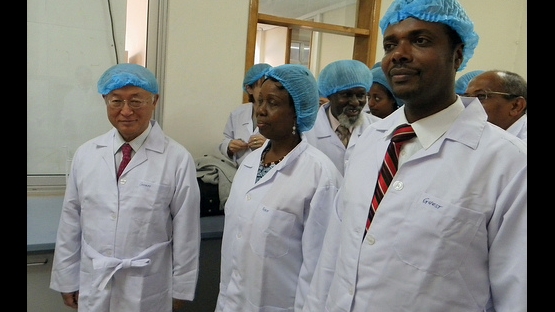IAEA Director General Yukiya Amano has paid a two day official visit to Ethiopia. During the visit, the Director General attended the opening session of the Second Conference of States Parties to the African Nuclear-Weapon-Free Zone Treaty (the Treaty of Pelindaba) and met senior African Union officials Dr. Dlamini Zuma, Chairperson of the African Union Commission,Tumusiime Rhoda Peace, Commissioner for Rural Economy and Agriculture, and Ramtane Lamamra, Commissioner for Peace and Security. The Director General also met Prime Minister Hailemariam Desalegn, and visited the Southern Tsetse Eradication Project (STEP) Tsetse Rearing and Irradiation Facility at Kaliti.
The IAEA supports the application of nuclear technology in over 40 countries in Africa in a wide range of areas through its technical cooperation (TC) programme. Human health is the top area of IAEA TC activity in the region at the moment, followed by food and agriculture. Other priority areas for TC in the region include human resource development, safety, industrial applications, water resource management and the environment.
To support the improvement of health services in Africa, IAEA TC projects support countries with capacity and infrastructure building to prevent, detect and cure major illnesses. Projects also assist in the planning and evaluation of nutrition programmes, as well as helping to establish quality assurance programmes for radiation dosimetry and the treatment of cancer.
In agriculture, nuclear techniques are applied to optimize water and fertilizer use; helping to avoid over-exploitation and save scarce resources while yielding successful harvests. In addition, by building regional capacity in induced plant mutation breeding, the IAEA helps farmers to improve crop resilience to local conditions, ensuring successful crop production in marginal conditions, as well as an income for farmers and food for the people. Insect control for animal diseases is a key focus of the programme. The IAEA has been providing strong support to the Southern Tsetse Eradication Project (STEP) for the last 14 years in the application of the Sterile Insect Technique (SIT) to control insect pests that transmit animal diseases.
Many of the IAEA’s technical cooperation activities in Africa are carried out on the regional level through the African Regional Co-operative Agreement for Research, Development and Training Related to Nuclear Science and Technology (AFRA). AFRA is the primary mechanism for technical cooperation among developing countries in Africa and for enhancing regional cooperation. The needs and priorities of the regional programme are defined in the AFRA Regional Strategic Cooperative Framework.




